- Home
- Alison Booth
The Indigo Sky Page 3
The Indigo Sky Read online
Page 3
George would never forget the morning that Jim first left for Stambroke College, not long after the pub and the bushland surrounding Jingera had been destroyed by bushfires. George had travelled to Sydney with Jim that day. Waiting at the bus stop in Jingera square that morning, George had watched his son saunter down the road leading to the lagoon, which was shimmering through the burnt-out bush. New growth had already started appearing and the blackened tree trunks had looked almost woolly with their covering of young shoots. Apart from his new school uniform, purchased too large to allow room for growth, you’d never have thought the boy was about to leave home. He’d looked too relaxed. So relaxed that he was affecting a funny walk. But George had known that Jim was far from tranquil. It wasn’t an easy journey that he was embarking on, and George had always been determined to smooth the way for him. Whenever he could he conducted him to and from school, and had been present at every Speech Day.
In some ways everything had changed since Jim left for Stambroke College, and yet nothing had changed. Jim had always been mature beyond his years and seemed almost like a young man, though he was barely sixteen. Once he’d share things with his father but now there was a reticence. That was only right, kids had to grow up and grow away. But there was a class gap there too that George tried not to think about. What he’d done in encouraging Jim to go to Stambroke was right but this distance still hurt.
Sometimes George wondered if his wife’s coolness to him might have been different if he’d been a solicitor rather than a butcher. Wash your hands, George! she still said to him every evening when he got home from work, even though he washed them before he left the shop as well as after he got home. Straight into the laundry he went but her response to his homecoming was automatic, even as he sluiced his hands noisily at the laundry tub, rubbing at them with hard soap and a scrubbing brush till they were almost as red and raw as the meat he served. It was over five years ago now that he’d heard her tell the boys: Wash your hands after handling money. You never know where it’s been. Maybe at the butchers.’ Jim had intervened at that point, though he’d only been ten. ‘Dad’s shop is the cleanest in town,’ he’d said.
For weeks now George had been counting off the days until this year’s Speech Day, and there were only another nineteen to go. Jim’s successes were to be celebrated, not taken for granted, and George glowed with pride at the thought of all the prizes Jim had taken the previous year. There would be more this year, no doubt about that. They weren’t just for academic work either; he was good at everything, including rowing, cricket and swimming and, in the winter, athletics. Not rugby though, he wasn’t the right build for that. You had to be shaped like a cube to be good at rugby.
Evidently Andy was developing too, in his own way. Only yesterday he’d told his father about his success at woodwork, coming top of the class for a joinery project at Burford Boys’ High School. ‘Well done, Andy,’ George had said heartily, slapping his younger son on the shoulder, before returning again to the topic that obsessed him: travelling to Sydney for Stambroke College Speech Day.
Chapter 4
‘It seems very quiet,’ Zidra said, as her mother stopped the car under a flame tree some twenty yards before what appeared to be the boundary of the Wallaga Lake settlement. ‘I’d expected masses of people.’ The only person in sight was the elderly Aboriginal woman sitting in a faded deck chair in front of the first building, a dilapidated fibro shack. She was wearing a loose-fitting floral dress and a red-and-yellow-striped woollen beanie. Although there were a couple of dogs lying on the ground next to her, they seemed too tired to take any interest in the visitors.
‘Be very friendly,’ her mother said, and Zidra sighed. As if she needed to be told.
Smiling and waving, her mother got out of the car, and walked across the rough grass. She was wearing her old brown dress and clutching the orange raffia handbag that had recently arrived from David Jones’ mail order. Zidra followed, with an assumed nonchalance that covered her nervousness. Not only was she terrified that the Hunters wouldn’t be here but she felt strange to be entering what Mama had described, only a few moments before as they drove across the causeway, as a place of incarceration.
‘Good-day’, Mama cried, in her poor imitation of Australian diction. The more she tried, the odder it sounded.
‘G’day,’ the woman replied, unsmiling.
‘G’day,’ Zidra echoed. The woman looked at her and grinned. Zidra beamed back. One of the dogs, a cream Labrador-cross, bared its teeth at her. ‘Good dog,’ she said hopefully, at which the Labrador summoned enough energy to wag its tail.
‘Won’t hurt youse,’ the woman said. ‘Lookin’ for anyone?’
‘We’re friends of the Hunters.’ Zidra’s mother now became rather voluble as she clarified the connection. Eventually she concluded, ‘Where do they live?’
The woman pointed to a shack some fifty yards further down the point. Beyond it, between the tall gum trees, Zidra could see the surface of the lake rippling in the strong easterly breeze.
‘Are they in today?’
‘Gone away.’
Zidra caught her breath at this news, but her mother simply said, ‘Do you know where?’
‘No.’
‘Where’s everyone else?’
‘Rob Lowe takem big mob in truck. Alex Fraser takem other mob. Pickin’ beans an’ corn.’
‘Are you sure the Hunters aren’t with them?’
‘Yairs. Bin gone months.’
‘I’ll leave a note under their door.’ After thanking the woman, Mama headed towards the shabby cottage she’d indicated.
Zidra waited behind. Her expectations dashed, she couldn’t think of anything to say to the elderly woman, who anyway appeared disinclined for conversation. To occupy herself, Zidra patted the cream dog.
Later, as they drove back onto the Bermagui road, Mama said, ‘What frightful conditions they live in!’
‘The views are lovely,’ Zidra murmured. She couldn’t bear the burden of her mother’s disappointment as well as her own.
‘Views!’ her mother exploded. ‘What are views when one is living in an internment camp?’ She drove unusually fast over the single-lane wooden bridge, narrowly avoiding a car that had stopped too close to the end, and accelerated along the causeway towards Bermagui.
Zidra held her breath. Her mother had spent years in a concentration camp during the war, and some years afterwards in refugee camps, and yet she never spoke to her of these. While Zidra occasionally thought of asking her, at the same time she didn’t really want to hear. Desiring information was one thing, but you couldn’t predict how you might be affected by that knowledge. And anyway she knew there’d be reasons for her mother’s silence. Including that Zidra’s grandparents had been selected for the gas chambers while her mother hadn’t.
Her mother added, ‘Is not this place like apartheid in South Africa, Zidra? Or the Deep South in the United States?’
‘We’re trying to help Lorna meet up with her parents, Ma. That’s all we can do.’
‘We’ll see about that, my dear. We’ll see about that.’
Zidra knew what this meant. More letters to the newspapers, more letters to politicians. Her mother’s preoccupation as she drove south meant she was already composing them.
After a while, Ilona said, ‘I never imagined the Hunters wouldn’t be at the Reserve. Next time I go into town, I’ll try asking at that camp just north of Burford. Maybe someone there will be able to tell me where they are. And then there’s that meeting in the New Year about the new housing development for Aborigines. There’s bound to be somebody who knows.’
Feeling reassured by this, Zidra said, ‘Anyway, there’s still a lot of time before the Jervis Bay trip.’
‘But it is the picking season. Beans and corn and who knows what else. The Hunters could have gone anywhere
to do that. But we shall find them, never fear.’
‘Can we stop at the Bermagui shops, Ma? There’s a Christmas card I need to send urgently.’
In the newsagency, Zidra rifled through the displays of Christmas cards, trying to find one with an appropriate verse. All she wanted was something that would indicate to Lorna that she should dismantle the layers of card to read a message concealed there. Nothing was appropriate though. She’d planned to glue together the two layers of card after writing ‘Jervis Bay is on’ inside, but there was little point in doing that if Lorna would never see the words. Anyway, she felt she shouldn’t raise Lorna’s hopes too much, in spite of what she’d told her mother. Maybe they wouldn’t be able to track down her family before the Gudgiegalah excursion. Mama had already decided that she and Zidra would go anyway but that wouldn’t make up for Lorna not seeing her family.
Perhaps it was better to go for a more straightforward message – although still subtle enough that the censors at Gudgiegalah wouldn’t notice. Eventually, in the religious section of the display stand, she found a card that she thought might be suitable. On the front was a Bethlehem scene. Inside, the printed message was the first part of Psalm 121.
I will lift up mine eyes unto the hills, from whence cometh my help.
My help cometh even from the Lord: who hath made Heaven and earth.
She’d always liked that, the first line in particular. Although perhaps the message was a little obscure for her purposes, it would do.
While queueing to pay for the card, she caught sight of a cellophane-wrapped packet of animal stickers displayed on a shelf close to the till. She picked it up and shook it a little. Yes, there was certainly an elephant in there. Not a green elephant but this grey one would suffice. She could colour it the same green as that toy wooden elephant that Philip Chapman had given her all those years ago at Woodlands. She in turn had handed it on to Lorna, in exchange for that flat pink shell that she still had on the bookshelves at home. There was no way that Lorna would miss this message. As soon as she saw the green elephant she would know who the card was from.
Next Zidra chose a bright green pen. After paying for all three items, she went up the hill to the Bermagui post office. At the counter, she eventually found a pen that worked and carefully wrote inside the card: Happy Christmas and holidays with best wishes from St Andrew’s Sunday School, Jingera. There was no St Andrew’s in Jingera, only St Matthew’s, and Lorna would remember this.
On the blank page next to the verse, Zidra pasted the sticker of the little elephant and coloured it with the green felt-tip pen. Next she sealed the card in its envelope and carefully printed on it Lorna’s name and address. After this she purchased a stamp and posted the card in the mailbox outside. Lorna would have it before Christmas Day.
Mama was waiting by the car next to the row of palm trees lining one side of the park. On the far side of the lawn, beyond a row of Norfolk Island pines, blue water sparkled and seagulls swooped around the tables and benches scavenging for scraps from the people lunching there.
‘I’ve bought Peter’s Christmas present from the bookshop,’ she said. ‘It’s Patrick White’s new novel, Riders in the Chariot. He will love it.’
He would love whatever her mother gave him because it was from her. That they were so devoted only occasionally made Zidra feel left out. Although most of the time she was glad not to have the full focus of her mother’s attention. ‘Now we’ll have a swim, Zidra, in the tidal swimming pool.’
This was the treat she’d talked about on the drive from Jingera to Wallaga Lake that morning. Her mother had been obviously nervous about the long sections of dirt road and they’d both been apprehensive that they wouldn’t find the Hunters at the Reserve. And they hadn’t. Nothing had been achieved.
Zidra got into the car and looked away when her mother stalled the engine. Slowly they drove around the headland to the steps leading to the pool.
As they walked down to the water, her mother said, ‘There was nothing like this when we lived in Bradford. It is perhaps just as well you don’t remember that dreary weather and the endless rain.’
Zidra had no recollection of emigrating to Australia. Her mother and Our Papa, both refugees, had met in Bradford. She’d been far too young when they left England to remember anything about the place. Her mother was the New Australian and she wasn’t, that’s what she preferred to think, anyway. That way she would blend in better.
Although she didn’t really feel like a swim, she understood that her mother wanted to drown her disappointment swimming endless laps. What she lacked in style she made up for in persistence. Zidra occupied herself by counting the different varieties of fish in the pool – there were nine – and afterwards seeing how long she could hold her head under water before being forced to come up for air. After her fourth attempt, she trod water while looking around for her mother. Nowhere to be seen and her heart skipped a beat; she might easily have got washed out of the far side of the pool over which waves were already crashing with the incoming tide. But no, there she was, sitting on the concrete edge of the pool at the sheltered end, her hair darkened by the water and her arms clasped over her chest in a protective gesture. She looked older than usual, and forlorn, as if the swimming hadn’t been reward enough. Zidra breaststroked over and tickled her mother’s foot.
‘Love you, Ma,’ she said.
Her mother smiled down at her and the years dropped away. Her darling mother, whom Zidra couldn’t bear to lose, exasperating though she sometimes was.
It had rained overnight again. You couldn’t ask for more than that, Ilona thought, as she rode with Peter towards the southern boundary of Ferndale. The early morning sunlight, slanting across the wet grass, illuminated beads of water so the paddocks sparkled, and the leaves of the bush beyond the furthest fence glistened as they gently turned in the breeze. To the south the sky was a deep purple, heralding more rain later, or so she hoped. It might fill the new dam that Peter had had excavated at the start of last winter. The contractors had thought it ambitiously large but they’d been proved wrong. Its location was perfect, the catchment area was good and already it was nearly full. In time rushes would grow around the edges and maybe ducks would nest there.
Now Peter stopped, and she watched him rescue a bleating sheep that had somehow managed to get its head caught between the wires of the fence to munch the grass beyond. After he’d mounted his horse again, they took a small detour to the eastern boundary and paused there for a few minutes, to watch the waves washing around the offshore pinnacles of rock. The usual population of black cormorants, perched on the furthest rock, seemed to be surveying their domain. To the south she could see row upon row of headlands, with Jingera just beyond the second. How lucky she was to have Peter by her side, day after day, sharing his life. Sharing the running of the place too, for she did the accounts and settled the bills and organised the paperwork that, until his marriage, he claimed had always been a mess.
At twelve noon they would return to the homestead to have lunch in the kitchen; today it would be leftover casserole from dinner last night. In the first year of their marriage, Peter had tried to learn half a dozen new Latvian words every lunchtime. He had a poor ear in spite of his love of music, and had struggled with the language. Initially he’d felt an obligation to learn it, though she herself had thought it was a waste of time, it would never be needed where they were living, beyond the black stump. Wait till I show you back o’Bourke, he’d countered, then you’ll really know what living in the sticks is like. Although he hadn’t taken her there yet, he still intended to. Once Zidra left school it would be easier to get away. But after that first year he’d abandoned all pretence at learning Latvian. What he termed his tin ear just wasn’t up to it.
Now she caught sight of the line of flame trees, still in flower, their vermilion petals glowing. God only knew why Peter’s grandparents had
planted these trees where they had, along the edge of one of the paddocks closest to the road, or how they’d guessed they might survive here. Peter certainly didn’t know why, and had never thought to ask them when they were alive. Now she remembered the splendid flame tree near the entrance to the Wallaga Lake Reserve. She sighed. She still couldn’t believe that the Hunters were no longer at the Reserve. You shouldn’t have expected them to be there, she told herself. Nothing is constant. People come and go, and wax and wane. Only the laws of physics remain the same.
Perhaps she should have told Zidra yesterday that finding the Hunters mightn’t be all that straightforward, but she hadn’t wanted to worry her. Someone will be able to tell me where the Hunters are, she’d said. There’s bound to be somebody who knows.
Yet now she wasn’t so sure. It was very easy for people to disappear, particularly if they had no reason to stay.
And her own history had taught her that they could disappear even if they had a reason to stay.
Chapter 5
Spears of light glanced off the harbour. The skiff danced over the wake of a ferry while the boys continued to pull in unison. The boat sliced faster and faster through the water, turning eventually around the buoy and heading back to Rose Bay. The early morning sky, the palest of blues, was rose-tinted to the east. Jim Cadwallader’s heart was pounding so hard he could hear blood thumping in his ears, and his early morning tiredness dissipated as adrenalin kicked in. Never before had rowing felt this good. They were moving so fast they had to be breaking their own record.
‘Maybe you’ve even got a chance of winning the Regatta next year,’ said O’Brien, the coach, when they were back at the boat ramp and pulling the craft out of the water. ‘As long as you buggers don’t slacken off.’

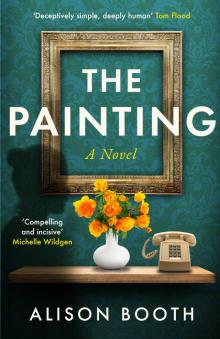 The Painting
The Painting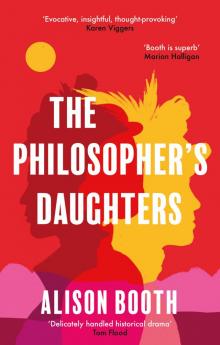 The Philosopher's Daughters
The Philosopher's Daughters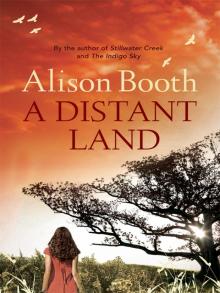 A Distant Land
A Distant Land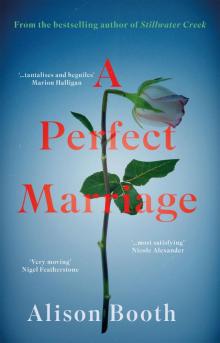 A Perfect Marriage
A Perfect Marriage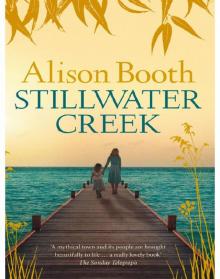 Stillwater Creek
Stillwater Creek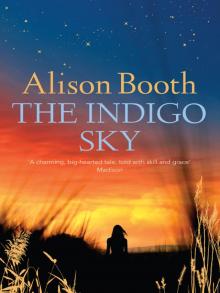 The Indigo Sky
The Indigo Sky